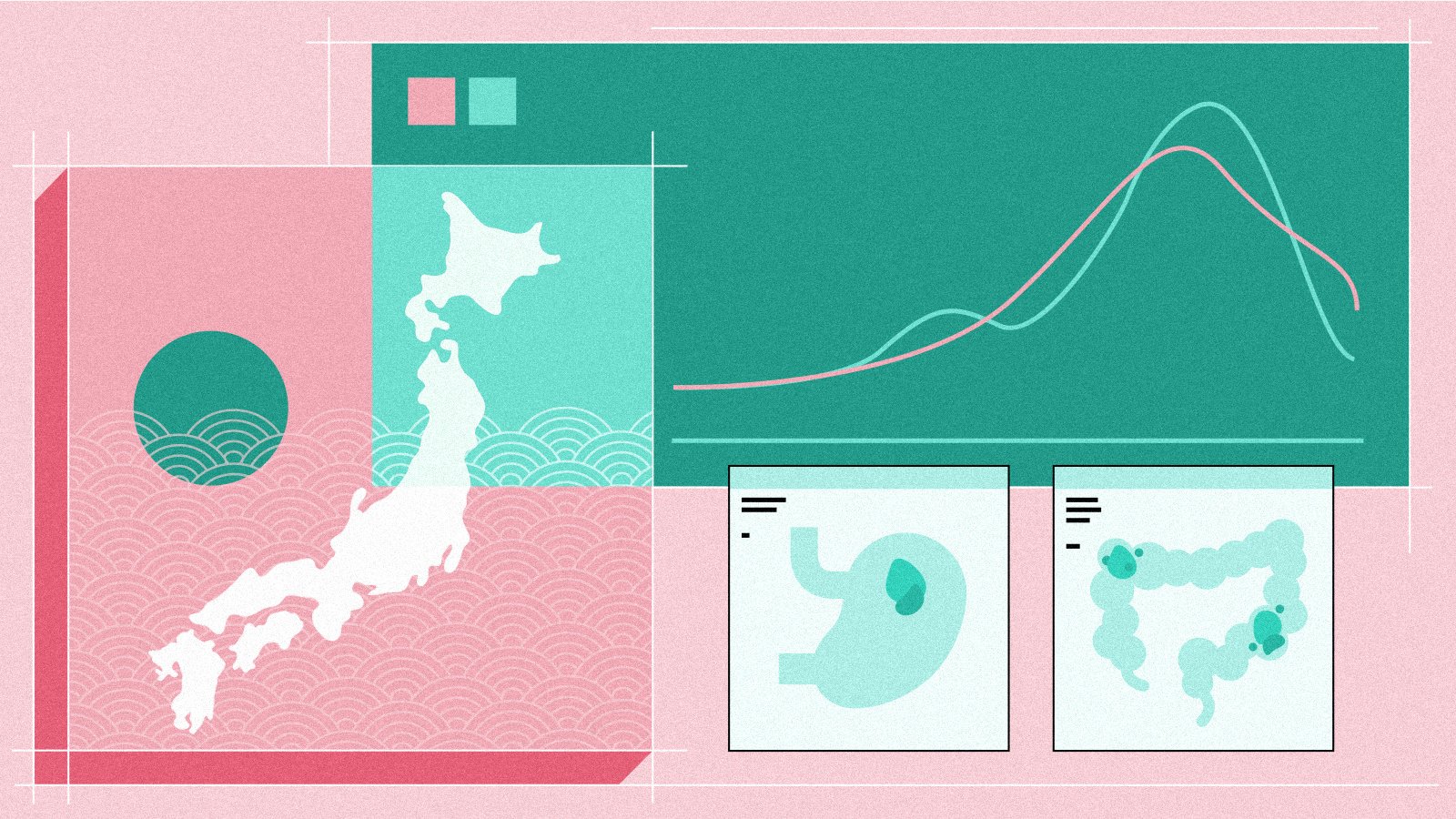Real-world data (RWD) derived from electronic health records (EHR) is key to understanding emerging oncology trends, such as the current rise in incidence of early-onset gastric and colorectal cancer, and its utility and potential are well-documented. However, Japan has limited real-world data sources to conduct comprehensive pharmacoepidemiological studies in oncology, despite interest from regulatory bodies like Japan’s Ministry of Health, Labour, and Welfare (MHLW) and the Pharmaceuticals and Medical Devices Agency (PMDA).
Addressing the evidence gap
Flatiron Health is addressing this gap by providing EHR-derived real-world data from Japan, building on over a decade of experience in real-world evidence (RWE) generation in the US. Using disease-specific common data models to harmonize data across countries, this study facilitated cross-country comparison of early-onset cancer trends. The patient-level data from the US and Japan, which was de-identified or anonymized in line with local data privacy regulations, was combined and accessed for analysis within a trusted research environment (TRE).

Analyzing trends in early-onset cancers
The study analyzed 811 patients in Japan (390 with colorectal cancer, 421 with gastric cancer), revealing a higher prevalence of early-onset cases in Japan than in the US. For colorectal cancer, early-onset prevalence was 27% in Japan versus 15% in the US (total n = 31,642), while for gastric cancer, the prevalence was 14% in Japan versus 10% in the U.S. (total n = 3,235). A key strength of this study was the availability of disease stage, metastatic diagnosis dates, and other clinical characteristics, abstracted directly from patient charts.
Gastric cancer results
Table: Patient Characteristics. The distribution of Stage in the Japan cohort was: 19 (3%) Stage I, 40 (7%) Stage II, 79 (14%) Stage III, 428 (74%) Stage IV, 14 (2%) Unknown.
|
Japan (N = 580) |
United States |
||
|
Stages I-III/Unknown |
Stage IV |
Stage IV |
|
|
Early-onset, No. (%) |
29 (19) |
61 (14) |
615 (11) |
|
Female, No. (%) |
43 (28) |
142 (33) |
1512 (26) |
|
Year of diagnosis, No. (%) |
|||
|
2015-2019 |
103 (68) |
328 (77) |
3,032 (53) |
|
2020-2023 |
49 (32) |
100 (23) |
2,690 (47) |
|
ECOG performance status at first treatment, No. (%) |
|||
|
0-1 |
74 (49) |
138 (32) |
3025 (53) |
|
2+ |
0 (0) |
15 (3.5) |
696 (12) |
|
Unknown |
78 (51) |
275 (64) |
2,001 (35) |
Figure: Distribution of age at diagnosis in Stage IV patients by country
Colorectal cancer results
Table: Patient Characteristics. The distribution of Stage in the Japan cohort was: 11 (2%) Stage I, 60 (10%) Stage II, 118 (19%) Stage III, 417 (67%) Stage IV, 17 (3%) Unknown.
|
Japan (N = 623) |
United States |
||
|
Stages I-III/Unknown |
Stage IV |
Stage IV |
|
|
Early-onset, No. (%) |
41(20) |
115 (28) |
3464 (18) |
|
Female, No. (%) |
85 (41) |
170 (41) |
8711 (45) |
|
Year of diagnosis, No. (%) |
|||
|
2015-2019 |
140 (68) |
202 (48) |
11242 (58) |
|
2020-2023 |
66 (32) |
215 (52) |
8046 (42) |
|
ECOG performance status at first treatment, No. (%) |
|||
|
0-1 |
92 (45) |
232 (56) |
10 948 (57) |
|
2+ |
0 (0) |
13 (3.1) |
2048 (11) |
|
Unknown |
114 (55) |
172 (41) |
6292 (33) |
Figure: Distribution of Age at Diagnosis in Stage IV Patients by Country (CRC: colorectal cancer)
While these preliminary findings are compelling, they should be interpreted with caution, as they are based on data from a single site in Japan, the National Cancer Center Hospital East (NCCHE). This hospital primarily serves a highly urban patient population, which may not fully represent the broader demographic of people with cancer in Japan. However, additional sites have recently been incorporated into the network, enhancing the representativeness of the Flatiron’s Japan data as these new sites are integrated.
Facilitating global evidence generation for high-priority oncology use cases
Harmonized patient-level EHR-derived datasets, available across Japan and the US, can be pooled for powerful analyses to deliver insights about the natural history of disease and the safety and effectiveness of medicines. Understanding how different cancers impact different geographical areas is critical for generating robust evidence to inform targeted treatment strategies. Further research will explore the generalizability of these findings and the survival outcomes for early-onset patients in both countries.
Contact us to learn more about Flatiron’s global real-world evidence solutions.
